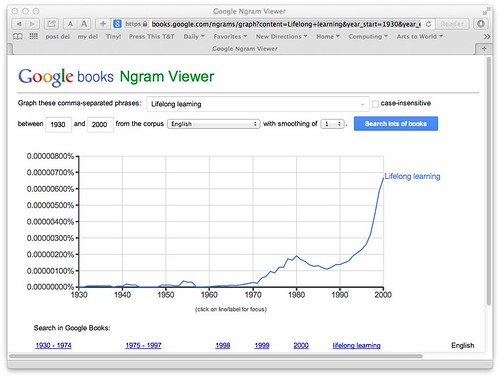We all know that our educational systems are broken in various ways. I want to talk about only one of them: the assumption that education is for the young. The educational system, indeed, our social system in general, is built on the premise that you get educated when you’re young, and that’s it. No more education for the rest of your life.
Just how much education you get various. We’ve got several recognized stopping points, high school, college, post-graduate, but they’re all thought of as stopping points. Your level of education slots you into the occupational system at a certain point and you stay there forever. High school sends you to a blue collar or pink-collar job while college sends you to a white-collar job. Post-graduate education prepares you for a specialized profession: law, medicine, architecture, research, teaching in higher education.
This system has been falling apart for as long as I can remember (I’m in my mid-60s). There’s always been ‘adult education,’ which has tended toward vocational training on the one hand and ‘enrichment’ for housewives and retirees on the other. But when your whole industry disappears and you’re only in your 30s or 40s, that requires more than standard-issue votech. You’ve got to rethink your life from the ground up.
And so the system has been adapting. Online learning fits nicely into this patchwork system because it allows people to learn from home and on their own schedule. It thus helps keep the system alive by allowing for more learning without challenging the underlying assumptions and institutions.
The deeper issue, it seems to me, is what role it can/will play in restructuring the whole system. THAT’s a big question. And I certainly don’t have answers.
One critical issue can be put in terms of a distinction between, education, shall we say, and training. Training assumes a certain set of skills of whatever type, and makes no attempt to change them. Rather it just extends the range of those skills. So, you’re a jazz musician in the swing style. You’ve got a certain repertoire. Training teaches you new tunes, “How High the Moon,” “All the Things You Are,” and so forth.
Education involves learning new fundamental skills. Our swing style jazz musician is now going to learn bebop, a different style. That requires a different approach to rhythm, harmony, and melody, all of it. That’s much more difficult than learning new tunes in an existing style. (As a practical matter, most swing musicians were simply unable to learn bebop, though most probably weren’t interested in doing it either.)
Education requires more mental “space” than training. It requires a different mental/behavioral mode. And switching from one mode to another, that’s one of the most difficult skills to master, if indeed it can be mastered in any general sense. Learning to schedule your sleep is one of the earliest mode-switches children have to master. And it remains a difficult and delicate one all one’s life.
Back when I was teaching at the university I observed that, once the Spring semester was over, it took me a good two or three weeks to reconfigure my mind from a routine that was dominated by the demands of teaching to a pure research “head.” Teaching required that I be at certain places at certain times doing certain things; it required interacting with people in certain ways. I couldn’t afford to “get lost” in my investigations if that’s what it took.
That’s the kind of thing I mean by mental mode. All that stories about kids no longer being able to read, kids losing their attention skills, that’s about mental mode.
The point of blocking out a four-year period of time for a college education is to allow the young person an extended stretch of time where they are relatively unconstrained by the temporal and mental demands of work. They can afford to get lost in the mazes of their minds and thereby to find themselves, and new ways interacting with the world.
At the opposite end of the life cycle we have people, like my father, who worked hard all their lives and now, once they’ve required, they don’t know what to do with their time. They can’t get out of work-mode. And so we now have retirement coaches to help train retirees into a different way of life. And we’ve got retirement communities affiliated with universities where the retirees can take courses.
How can we give people more flexible access to their minds? The general interest in meditation over the last half-century speaks to the same set of issues. How, on the most fundamental level, do we marshal and focus our mental resources?
Online learning presents the same set of issues and challenges. In what ways does it facilitate training and education? We need both, training and education, but education is harder because its demands are deeper. Once again we are faced with the need to learn how to learn, in a new set of media.
A brave new world awaits us.
* * * * *
Here’s a Wikipedia article on lifelong learning. Here’s an Ngram search on “lifelong learning”:

No comments:
Post a Comment